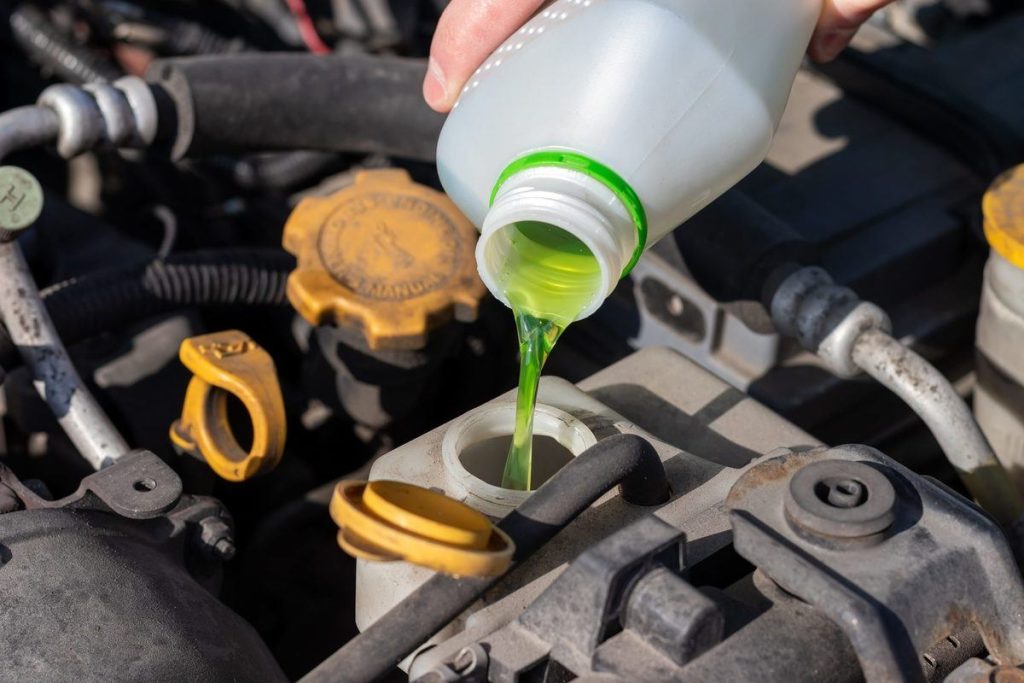Let’s start with a basic understanding of what engine coolant is and why your car needs it.
As the engine is the main source of power for your vehicle, it’s normal for it to get quite hot. One of the ways we prevent the engine from overheating is by using engine coolant. Coolant also lubricates the moving parts and protects other parts, such as the water pump, head gasket, cylinder and pistons.
When the engine is running, the coolant continuously circulates through the engine and back through the radiator.
Why is my car losing water and overheating?
Water can be used temporarily as a coolant, but over time it will cause rust and corrosion. Therefore, the most common types of coolant are those that are a mixture of ethylene glycol and water or propylene glycol and water.
When there isn’t enough water or coolant to keep the engine temperature down, the car will overheat. There are a few reasons why your car may be losing water or coolant. There may be an internal leak, an external leak, or some other faulty part that is causing the coolant level to drop.
I have to put water in my car every day
If you’re using water instead of coolant fluid, you may find that you need to put water in your car every day. That’s because water evaporates much quicker when heated. So the heat of your engine will cause the water to evaporate.
It’s better to use a proper coolant fluid which is designed to sustain high temperatures.
If you have to put water or coolant in your car every day, you most likely have some sort of water or coolant leak. The leak may be one of the following types:
- a split, crack or hole in the coolant hose
- a radiator leak
- a leaking heater matrix
- a failure or fault with the coolant pump seal
- a leak between the coolant pump and the engine block
Coolant level dropping but no leak
If the coolant levels are dropping but there is no apparent leak, there may be another problem, such as:
- a bad head gasket (causing the coolant to flow into the cylinder and evaporate)
- an invisible leakage point (you may need to use an air pump and pressure to try to make the leak visible)
- an internal leak that you cannot see (coolant may be leaking into the engine)
- a faulty reservoir cap (may lead to a fault in the pressure build up, overheating and then coolant burn-off)
What would cause a car to burn engine coolant?
The cause of a car burning coolant is often a faulty head gasket. The gasket separates the cylinder from the bottom of the engine. So if the gasket leaks, coolant may escape and enter the combustion chamber of the cylinders.
If coolant enters the cylinders, you may notice white smoke coming from the exhaust.
How long does coolant last in a car?
The level of coolant in your vehicle will decrease over time, but usually at a slow rate of only two to three ounces a year.
This equates to approximately 0.25% every four to six months.
A good rule of thumb is to have the coolant system flushed and changed about every 50,000 to 80,000 kms.
We recommend that you refer to your vehicle manual for information about how often to change or top-up the coolant fluid for your particular make and model.
How to find a coolant leak without a pressure tester?
A coolant leak is often visible by a puddle under the car when it is parked. It’s important to note that there are many different types of car fluid leaks, so look for a colourful puddle (pink, red, green or blue).
A puddle from a coolant leak will have a watery consistency, and when it comes into contact with a hot surface (hot pavement, a hot exhaust pipe), it can create noticeable steam.
The other thing you may notice with a coolant leak is the “check engine” light illuminating on your dashboard. When the coolant level is low, it affects the temperature level in the engine, which may trigger the warning light.
Lastly, check your radiator, radiator hoses and coolant reservoir if you think you may have a coolant leak. Any damage, holes, cracks or stiffness in the hoses may be the cause of a coolant leak.
If you suspect that your car may be leaking coolant, or you’re not sure whether your vehicle needs its coolant flushed and changed, get in touch with the experts at Mt Roskill Collision Centre and we can help out.
Call us on 0800 227 762 or email [email protected] for professional and friendly car servicing advice.
